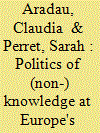| Srl | Item |
| 1 |
ID:
185784


|
|
|
|
|
| Summary/Abstract |
From statistical calculations to psychological knowledge, from profiling to scenario planning, and from biometric data to predictive algorithms, International Relations scholars have shed light on the multiple forms of knowledge deployed in the governing of populations and their political effects. Recent scholarship in critical border and security studies has drawn attention to ‘the other side of knowledge’ and has developed a vibrant conversation with the emergent interdisciplinary field of ignorance studies. This article proposes to advance these conversations on governing through non-knowledge by nuancing the analysis of power/(non-)knowledge/subjectivity relations. Firstly, we expand the analysis of non-knowledge by attending to the problematisation of errors and fakes in controversies at Europe's borders. Errors have emerged in relation to border actors’ practices and technologies, while migrant practices, documentation, and narratives are deemed to be potentially ‘fake’, ‘fraudulent’, or ‘false’. Secondly, we explore how different subjectivities are produced through regimes of error/truth and fake/authenticity. We argue that there are important epistemic differences between ‘fake’ and ‘error’, that they are entangled with different techniques of power and produce highly differentiated subjectivities. Finally, we attend to how these subjectivities are enacted within racialised hierarchies and ask whether non-knowledge can be mobilised to challenge these hierarchies.
|
|
|
|
|
|
|
|
|
|
|
|
|
|
|
|
| 2 |
ID:
183727


|
|
|
|
|
| Summary/Abstract |
How must we understand and conceptualize the rationales and repercussions of remote warfare? This article contributes to scholarship on the ontology of remote war by analysing how Dutch officials engage with responsibility for the bombardment of an Islamic State weapons factory in Hawija, Iraq in 2015 under Operation Inherent Resolve. It observes that the main feature of Dutch officials’ accounts of Hawija is their diverse claims to not knowing about civilian casualties. Official narratives shifted from denial to secrecy to strategic ignorance. Bridging work on secrecy from the field of critical security studies with work on strategic ‘unknowing’ from ignorance studies, we propose a new take on the Foucauldian notion of ‘regimes of truth’. The regimes of truth that emerge to justify shifts to remote warfare – that it is riskless, precise and caring for civilian others – rely not merely on secrecy and denial but on feigned and imposed ignorance about casualties. Whereas denial can be disproven and secrecy has an expiration date, ignorance is more elusive and open-ended and hence politically convenient in different ways. Deliberate unknowing does not just postpone investigation and accountability but fundamentally and indefinitely obstructs it and thus sustains the regimes of truth for future remote wars.
|
|
|
|
|
|
|
|
|
|
|
|
|
|
|
|